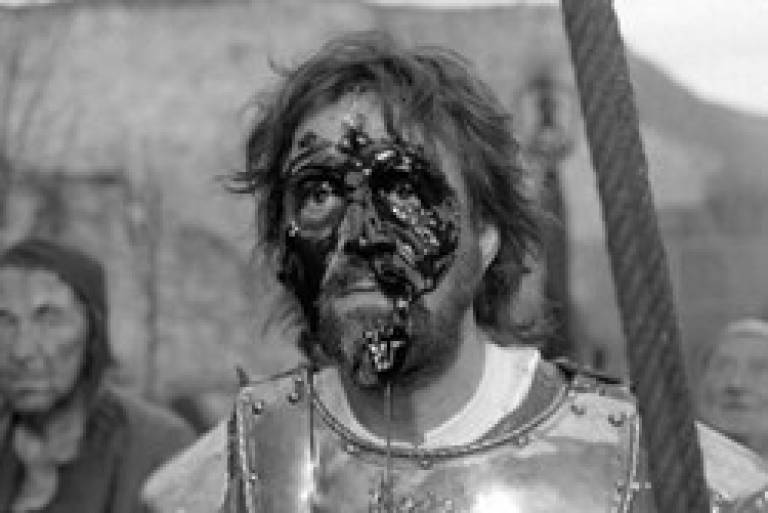Round-table discussion of Aleksei German Sr's Trudno byt´ bogom (Hard to be God, 2013)
09 May 2016, 6:00 pm–8:00 pm

Event Information
Location
-
UCL Institute of Archaeology, 31-34 Gordon Square, London WC1H 0PY, room G6 LT
This round-table discussion will be led by Julian Graffy (UCL
SSEES), Alex Graham (UCL SSEES) and Eugénie Zvonkine (Université Paris
8), who will all present position papers, as outlined
below, after which the audience will be invited to ask questions and take
part in a discussion of the film.
Julian
Graffy: "My Friend Don Rumata"?
Julian’s contribution to the round table will consider the links, and the ruptures, between Hard to be a God and German's earlier films My Friend Ivan Lapshin and Khrustalev, My Car!
Julian Graffy is Professor Emeritus of Russian Literature and Cinema at UCL. He has written widely on Russian cinema, and his current project is concerned with the representation of foreigners in Russian film. His most recent publications are studies of Andrei Zviagintsev's Leviathan, Petr Buslov's The Boomer and Sergei Sel'ianov's The Time for Sadness Has Not Yet Come.
Alex Graham: ‘My whole life in your cinema has been a swim in shit’: some thoughts on a visual psychology of inner experience in Trudno byt' bogom
This paper approaches the world of Trudno byt' bogom as a psychological field, in which the repressed thoughts, feelings and memories of the protagonist Rumata are made manifest as visual phenomena and sensory experiences. With a focus on camerawork and spectatorial address, it explores how we might understand the human gazes and gestures that are directed at us from inside the diegesis. Building upon this interest to examine the film's representation of sexuality and bodily functions, it considers the ways in which the smelling, touching and penetrating enacted by diverse characters in the film can be read as brutal expressions of Rumata's inner experience of disgust, impotence and shame before this hostile world. Finally, to illuminate this reading, it situates the character psychology of the film in relation to that of its literary source, arguing that the narrational exploration of Rumata's mind in the Strugatskii brothers' novel make theirs the ‘rational’ recto to Aleksei German's ‘irrational’ verso of the fantasy text.
Alex Graham is a PhD candidate at UCL SSEES, working under the supervision of Dr Philip Cavendish. His doctoral research investigates the politics of film production at Lenfil'm between 1961 and 1991, looking especially at the studio's innovations in cinema aesthetics, its discourses of auteurism and its reorganisations of film production during this period. His early research on the then completed films of Aleksei German Sr. was published as ‘Immersion in time: history, memory and the question of readability in the films of Aleksei German’ in the journal Studies in Russian and Soviet Cinema 6, 2012, 2, pp. 177-216.
Eugénie Zvokine: A half-century trajectory: from the original script to the finished film, 1968-2013
Eugénie’s contribution to the round table will examine the evolution of the project from its initial script, co-written by the brothers Strugatskii and Alexei German in 1968, to its final version and the finished film. The changes are a testament not only to the modification of the conception of science-fiction and fantasy cinema in the Soviet and post-Soviet context, but also to the evolution of the director’s style and view of the world.
Eugénie Zvonkine is Senior Lecturer at Université Paris 8. She has written a volume on Kira Muratova: Kira Mouratova, un cinéma de la dissonance (ed. L'Age d'Homme, 2012) and has published several articles on Soviet and post-Soviet cinema. One of her most recent publications is ‘The artistic process of Aleksei German, Studies in Russian and Soviet Cinema, 9, 2015, 3, pp. 154-83.
 Close
Close

